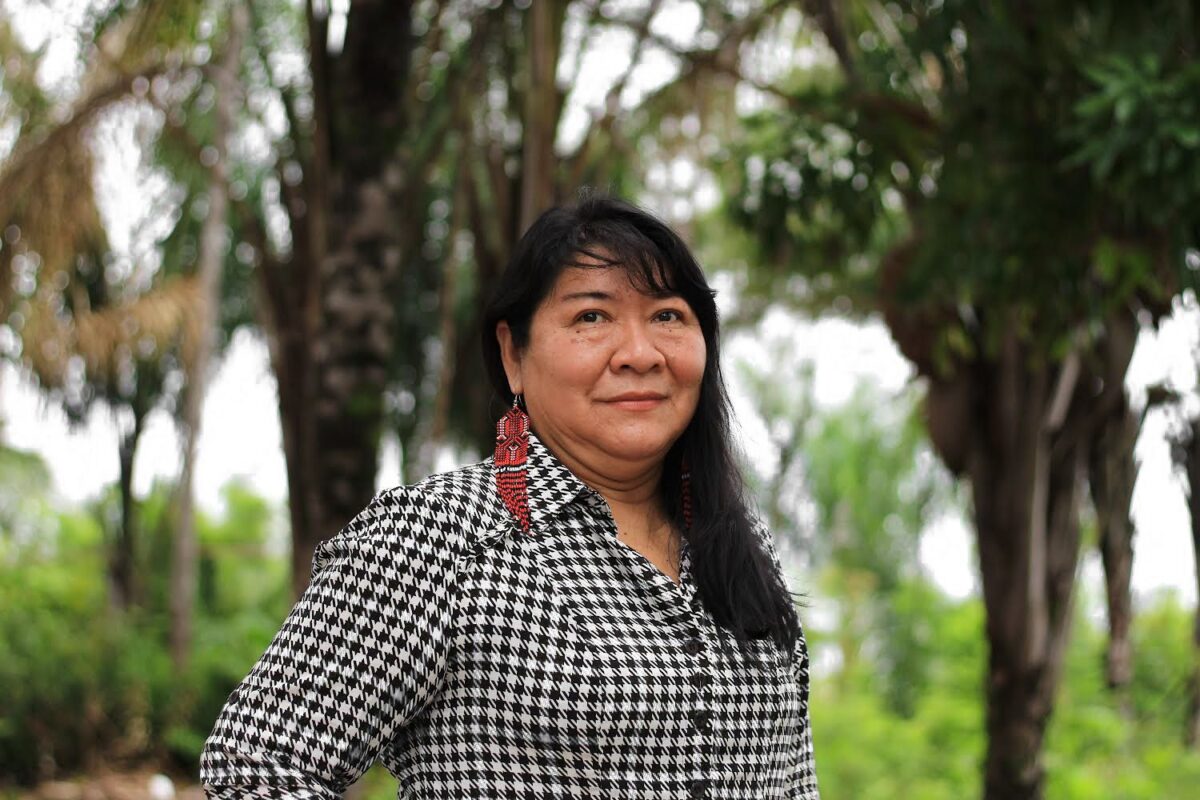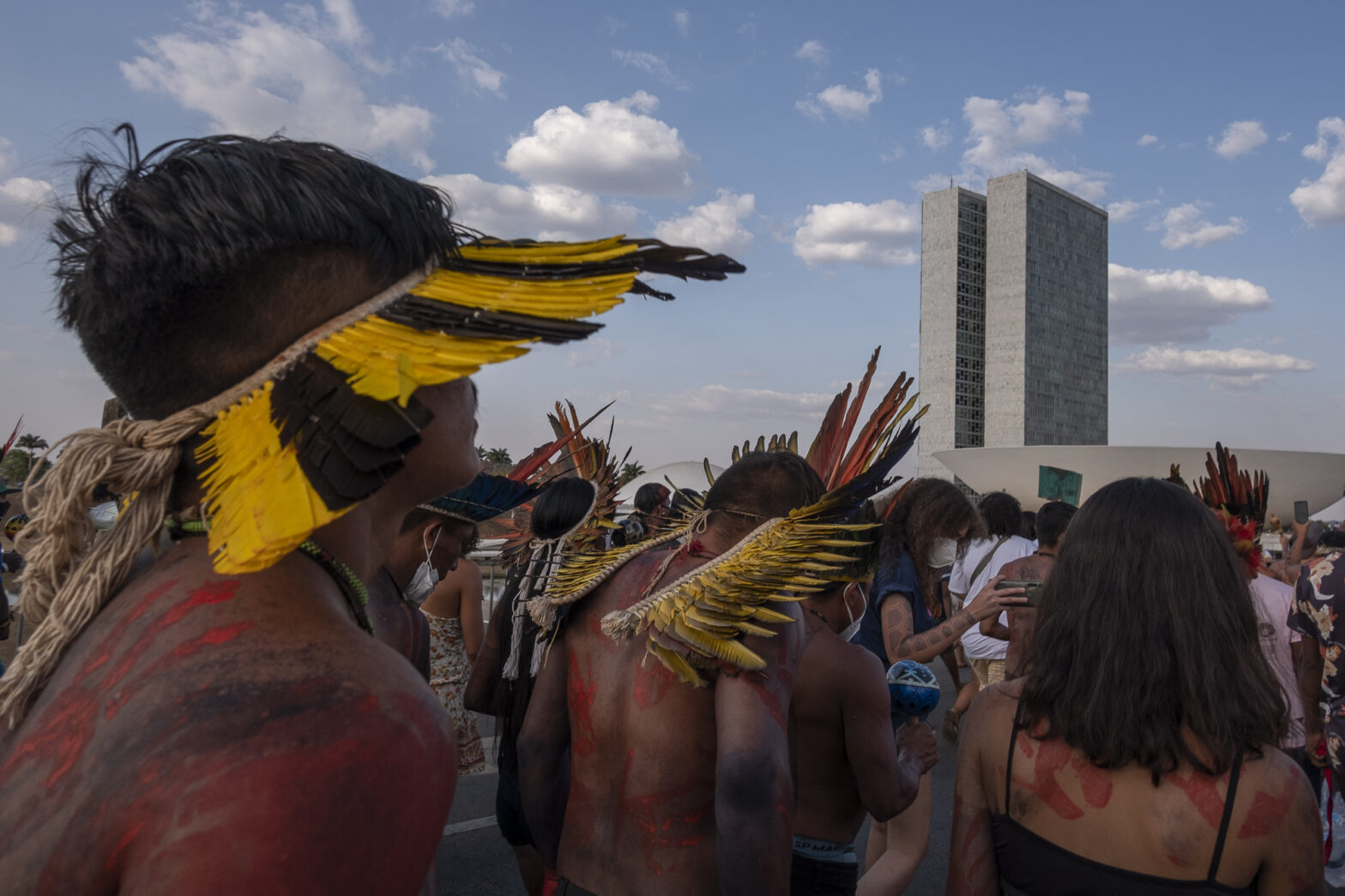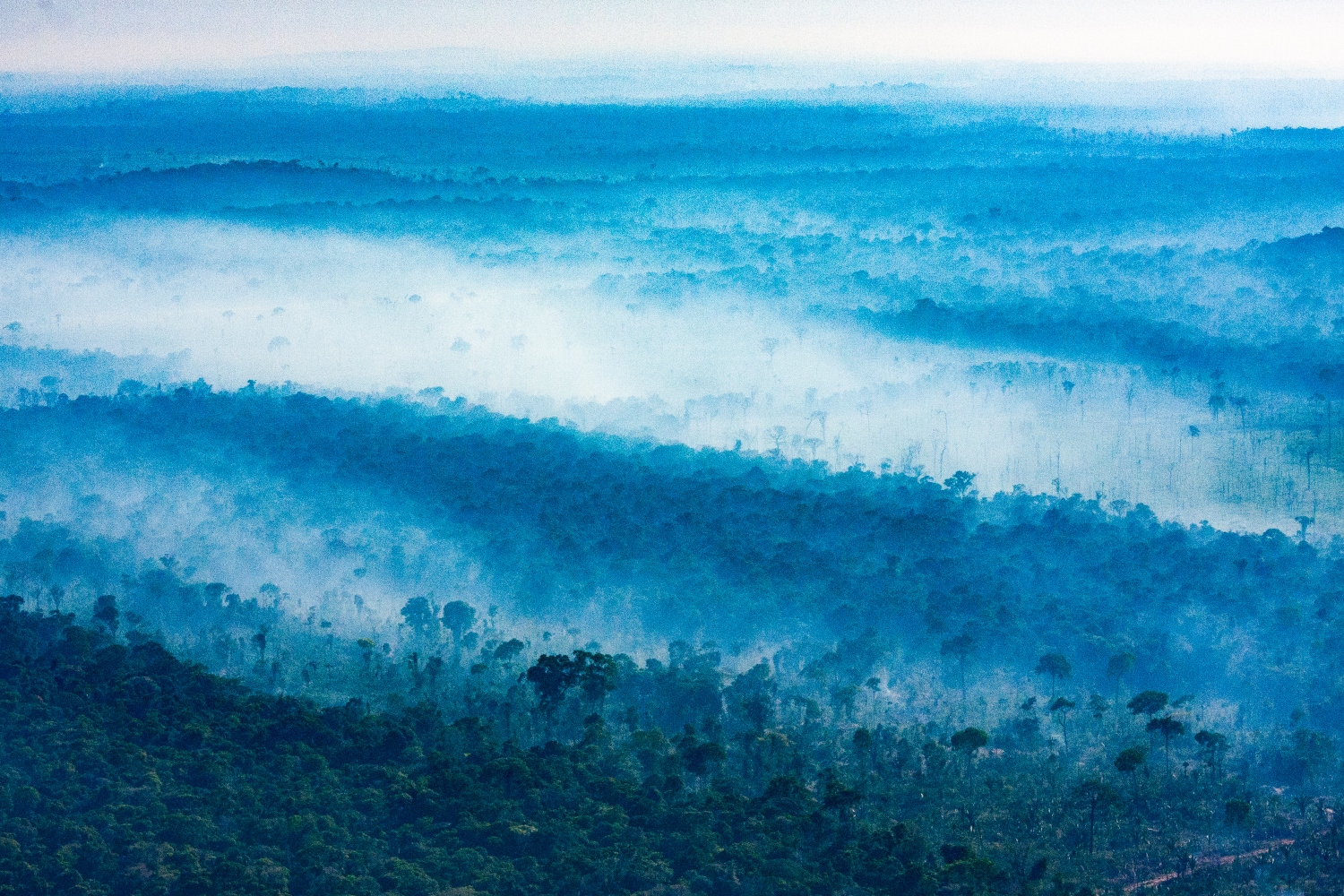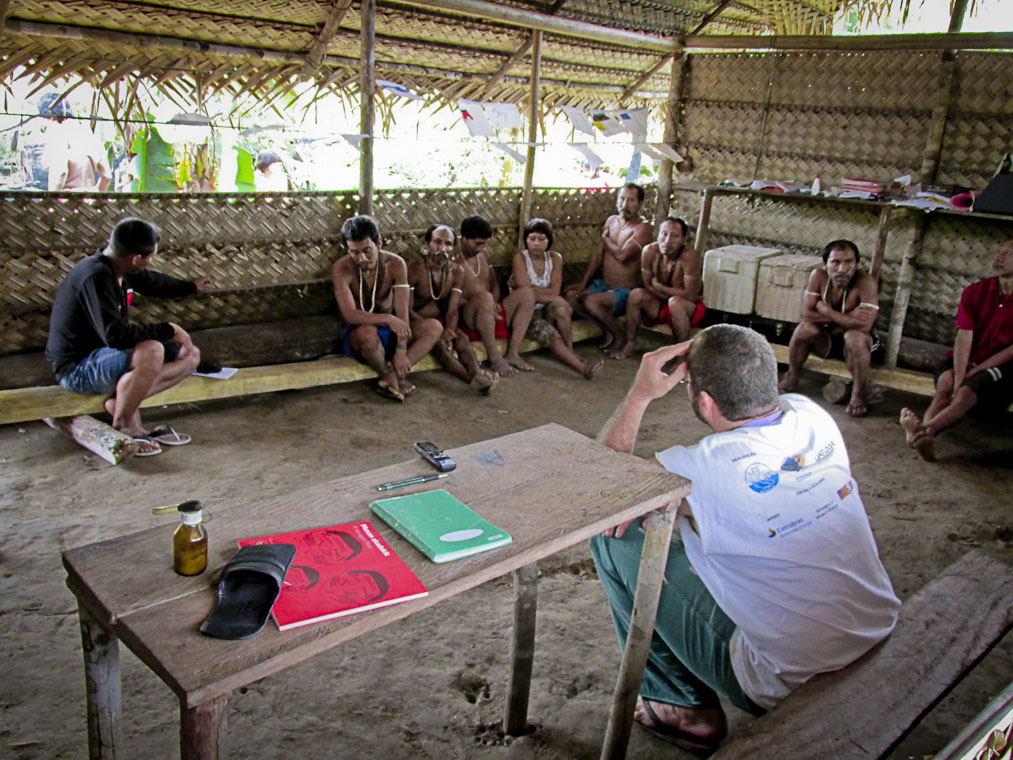Funai’s new president, who took office on February 3, told InfoAmazonia in an interview that the [agency’s] budget for demarcating and protecting Indigenous Territories is approximately R$ 90,000, which means she will be looking for alternatives for getting the agency back up and working.
Joenia Wapichana is the first Indigenous woman to head the National Indigenous Peoples’ Foundation (Funai: A federal agency created in 1967 with the responsibility for implementing policies for the protection and promotion of indigenous rights throughout the national territory.), the national agency created in 1967 to create policies to protect and promote Indigenous rights in Brazil. Wapichana is an attorney, and was interviewed by Infoamazonia in the days between finishing her term as Federal Congressional Deputy and being sworn in as Funai president on February 3. In her opinion, the agency’s current budget could prevent it from carrying out its responsibilities as the main advocate for the rights of Indigenous peoples in Brazil, who occupy nearly 14% of the national territory. Wapichana comments that it is “an insufficient budget, totally precarious for the size of the obligation Funai must uphold by law.”
With only R$ 600 million currently budgeted for 2023 (equal to 0.001% of the Federal budget of R$ 5.3 trillion) she says that Funai would have less than R$ 90,000 to develop demarcation projects demarcate and protect Indigenous Territories: Union territories recognized and delimited by the federal government for the maintenance of the indigenous ways of life and culture throughout the country.— referred to as TIs —which are Federally demarcated and recognized for the purpose of maintaining Indigenous ways of living and culture throughout Brazil. Wapichana believes a solution must be found and proposed one during the interview: to call on the Amazon Fund as well as Indigenous organizations and other funds.
In the interview, Wapichana states that Funai is currently “in a state of deprivation”. She also recalls her four years as the only Indigenous woman serving as Deputy in the Chamber of Deputies, a lower house in the federal Congress, where she chose to occupy cabinet number 231 because it carries the same number as the article in the Constitution guaranteeing Indigenous peoples the rights to their traditional lands. Wapichana also highlighted some of the anti-Indigenous bills introduced during her political term: PL-191 / 21, which would allow for the exploration of mineral ores, oil and water resources within Indigenous Territories; and PL-490 / 07, which would make the demarcation of Indigenous Territories unfeasible.
Born in the Indigenous community Truaru da Cabeceira on the outskirts of Boa Vista, state capital of Roraima, Joenia Wapichana became Brazil’s first Indigenous person to earn a law degree, at the age of 24. After earning her degree from Roraima Federal University (UFRR), she earned a Masters in International Law from the University of Arizona in the United States. In 2008, she became known throughout Brazil for being the first Indigenous lawyer to present an oral argument in the Federal Supreme Court in the case securing demarcation of the continuous land area composing the Raposa Serra do Sol Indigenous Territory in Roraima.
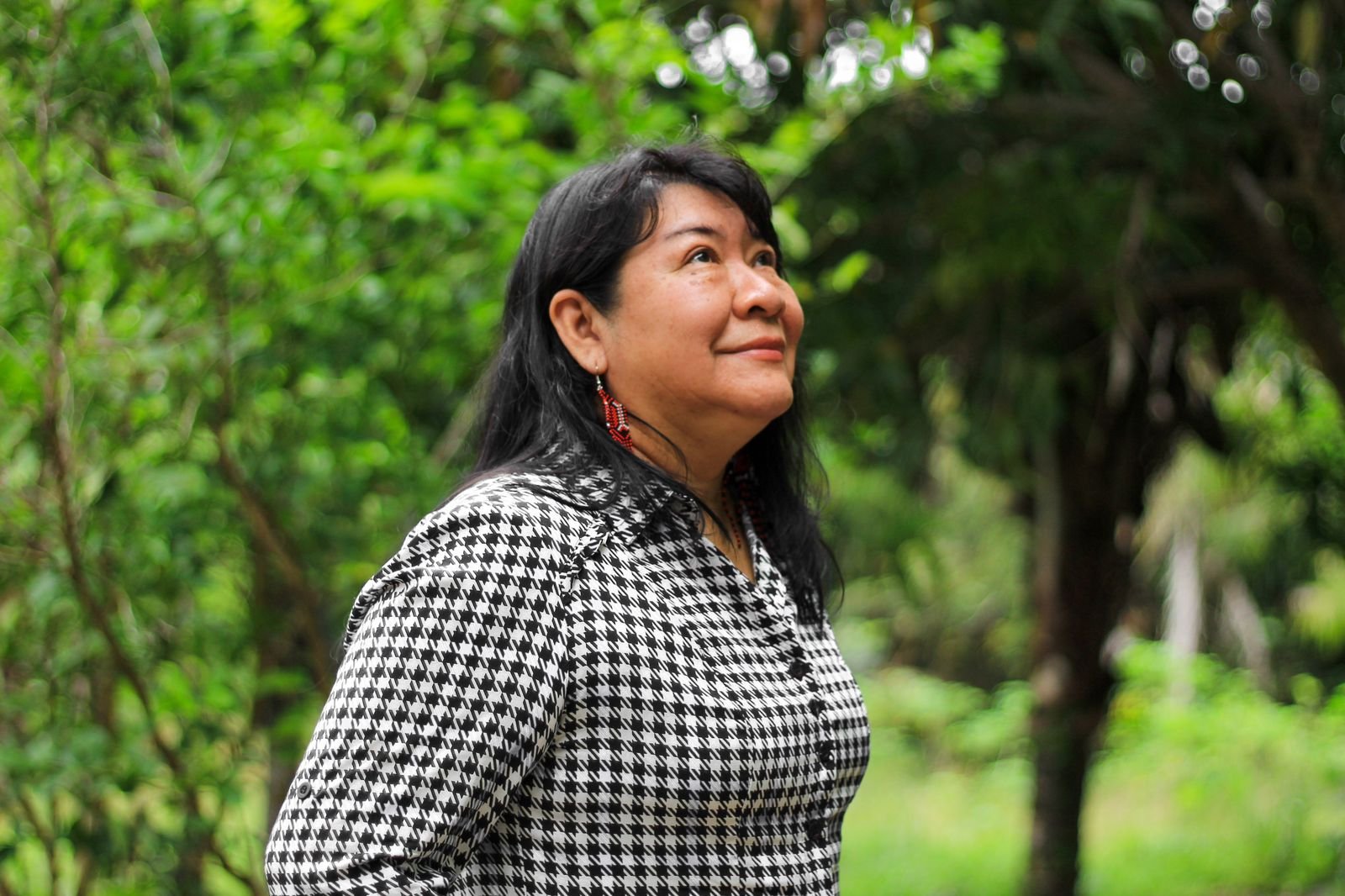
Infoamazonia – What were your four years as the first Indigenous woman to be a Federal Deputy in Congress, and to hold that role under the Bolsonaro administration?
Joenia Wapichana – My political term was marked by conflict. Mostly, it was a fight to defend our rights so things wouldn’t regress. And it was a fight that was based on the principles of participation, meaning the Indigenous peoples were able to participate collectively, because the collective plays a large role in Indigenous principles. And mostly, [it was a term] of resistance–resistance so that our rights, which are in fact few, would not be further reduced. This is why it was full of conflict because we couldn’t let any of these anti-Indigenous bills be passed. And not one was passed.
What were these bills? Can you describe them and tell us where they are now?
Time frame plays a large role in the text of bill PL-490/2007, which addresses changes to the demarcation of Indigenous Territories, and we managed to hold it in the CCJ [Constitution and Justice Commission] for a long time so it wouldn’t be approved, but it’s still there. It was approved in the CCJ, but it didn’t make it to the Senate, nor to the Chamber of Deputies.
There was PL-191/2020, which was fast-tracked but the text was not approved. We fought strongly against it. It used the war in the Ukraine as justification for legalized mining on Indigenous lands. Then there was PL 3275/2021, which could open a very negative precedent for reducing Indigenous Territories. So, we could say that no bills that were negative, let’s say, in an anti-Indigenous sense, were passed.
On the other hand, we did pass PL 11042/2020, defining a plan to take on COVID-19 inside Indigenous Territories and quilombos, [traditional Afro-Brazilian communities] for which I was rapporteur. Bolsonaro vetoed 22 items in this bill, even during the pandemic, but we managed to override the vetoes and the Law was passed, viable for [the state to respond to] any pandemic or epidemic [inside Indigenous Territories and quilombos] that may happen in Brazil.
We also, in [PL 5.466/2019], managed to change ‘Indians’ Day’ to ‘Indigenous Peoples’ Day’—a bill to change the wording to recognize the issue of the collective, of the territory and of the cultural diversity of Indigenous peoples.
What was the most difficult part of those four years (2019-2022), looking back from January 2023?
The most difficult part was the Bolsonarism, the fascism, all these things affecting us today. The consequences of these four years are really the fact that they impeded the protection of Indigenous peoples’ lives, especially against the pandemic. We saw what went on. And now, at the end of my term, there is the Yanomami crisis and I feel the same. As coordinator of the Indigenous front, as a parliamentarian from Roraima, as a Wapichana person, I had been saying that this was going on since the first year of my term.
When I led the External Congressional Committee on the Yanomami people, when I was doing due diligence, we could see and recommend that urgent action needed to be taken to avoid deaths. We are now witnessing this humanitarian crisis. All the alerts that we issued in recent years, ignored by the Bolsonaro administration, resulted in deaths. It’s terribly sad and generates a lot of indignation because we are talking about preventable deaths. Preventable if action had been taken at that time to control the advance of mining if they had taken precautions. If resources had not been diverted from Indigenous Healthcare, if the Healthcare budget had not been cut, and if the person in charge of Indigenous Healthcare had been responsible, these deaths could have been avoided.
And in what state do we find Funai and Indigenous Healthcare today? In other words, what was the state in which the Bolsonaro administration handed over the structure to care for the peoples and the end of its term?
Funai’s situation today is deplorable because it was completely scrapped, dismantled. It’s a situation of inadequacy, precariousness in which public employees were persecuted, devalued and misled. The first impression I had when I visited Funai was relief on the part of the workers there, saying ‘look, Funai is back’. Right now we are assessing what we have today so we can fix the situation in terms of the structure, the projects and the demarcation of Indigenous Territories. It will take some time to recuperate everything that was taken apart.
It’s a situation of inadequacy, precariousness in which public employees were persecuted, devalued and misled. The first impression I had when I visited Funai was relief on the part of the workers there, saying ‘look, Funai is back’.
Joenia Wapichana
Funai was created to fill a constitutional purpose: to protect and promote the exercise of the rights of Indigenous peoples, especially in terms of their right to land, which is the main right of Indigenous peoples. Funai is the federal agency responsible for demarcation, identification, removal of intruders and monitoring, so it plays a very important role in the lives of indigenous peoples.
So when Bolsonaro stopped allocating resources in the budget for Funai to carry out its constitutional obligations, he intentionally weakened the rights of Indigenous peoples and left an opening for illicit parties to enter Indigenous Territories.
What is Funai’s budget today? And will there be any budget increase?
About R$ 600 million was approved for 2023 in the last LOA [Annual Budget Resolution]. Of these resources, nearly R$ 400 million are to keep Funai operating, which leaves R$ 200 million, of which R$ 100 million will be to pay contracts like rent on Funai headquarters, for example. So of these resources, if you add it up, less than R$ 90,000 is left for protecting Indigenous Territories and demarcation. So, it’s a weak budget, precarious in relation to the extent of Funai’s legal obligations. We will need to increase it.
In order for Funai to be able to develop its projects, activities and programs, we will have to seek out alternatives, form partnerships with Indigenous organizations and have support from funds. This includes the Amazon Fund, a project that captures and invests national and international resources to promote the conservation and sustainable use of Amazonia. We can’t be limited by the [slated] budget. The Lula administration has good intentions to support Indigenous peoples and we believe we will be in good conditions to move forward. Of course, all the needs can’t be met overnight, and we will have to be very strategic to be able to move forward, especially with demarcation.
Will moving forward with demarcations be a priority for Funai?
Together with protection [of Territories].
My last question is about the Yanomami crisis. You already commented on the situation, but could you tell us a little bit more about what has happened in recent days, about what’s being done?
I’m following the situation as a Deputy and as the future Funai president, and things are still extremely serious. Many patients, many Yanomami children and adults are arriving at the Surucucus center seeking medical care. The Funai employees have been reporting the agency’s activities to me—they have been distributing food and are receiving donations from the public, especially of tools, hammocks and food.
This early support of the Health Ministry’s campaign is very important, as they have declared a state of emergency and are calling other government agencies to work together with them. SESAI [the federal Indigenous Healthcare System] also took action. Its coordinator, Weibe Tapeba, shared the scenario with me and we have to work together right now to combat the hunger, the child mortality that could have been avoided if swift and responsible action had been taken in time. It is completely inadmissible that children are dying because they have no access to medicine, or because no preventive measures were taken against malnutrition, parasite infections and pneumonia. These are diseases that could have been cured, had anyone taken responsibility for the situation at the right time.
It is completely inadmissible that children are dying because they have no access to medicine, or because no preventive measures were taken against malnutrition, parasite infections and pneumonia. These are diseases that could have been cured, had anyone taken responsibility for the situation at the right time.
Joenia Wapichana
It is important that doctors are on location, and that the Army and Air Force offer logistical support to get medical teams in. It is a group action on the part of the entire Lula administration that came to Roraima to show that attention must be paid to the situation. Of course we are also putting plans together to provide data on illegal mining to the president’s cabinet because there is a context surrounding this situation. And a task force must be created to combat illegal mining. Funai will be together in this fight, coordinating work groups as well.


